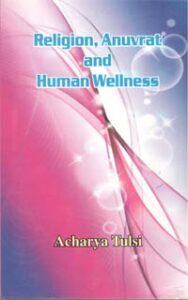
Religion, Anuvrat and Human Wellness

About the Author
Acharya Tulsi was a great connoisseur of the gems of the human beings. He was a skilful sculptor. He was an artist of high caliber. He transformed many an unchiselled stones in form of human beings into excellent statues as nuns and monks. Acharya Tulsi remained in the office of Terapantha religious order for 60 years. His tenure as the Acharya was a golden period in the history of this religious order. He had the wonderful gift of adjusting himself with the changing stream of time. Acharya Tulsi, with his indomitable will power and firm determination realized every dream that he visualized. He had to face great hurdles, obstacles and strong opposition, but with his firm resolution, he overcame them all. He possessed a multidimensional personality. For the welfare of humanity, he introduced perceptional meditation, Anuvrata, science of living and training in non-violence. Acharya Mahapragya, Yuvacharya Mahashraman and Kanakprabhaji, the head of nuns, are his unique creations.
About the Book
- Why religion is necessary in the modern world?
- Why do the modern minds fail to understand the significance of religion?
- How can a religion make itself reach out to the masses?
- Is science and religion opposite to each other?
- How can equability be established amongst all religions?
- Anuvrata: Its inception, fundamentals and working
- What are the duties of a religious person?
- How intellectualism and spirituality are co-existent?
- An insight into Terapanth
- The constituents of devotion: knowledge, vision, conduct and penance
- The ideal of rectitude
- How aggravating sensual passion is a problem and what are the solutions?
- Why one should fast?
- Self- control
- Sense of individuality in building of a society
- The concept of unity in diversity
- How mere learning is not sufficient for progress?
- Faith: the basics of Unity
- Democracy: India and the World
Religion
It is quite interesting to see that how Acharya Tulsi Ji could comprehend some of the most complex and sensitive topics in the simplest of words and his outright approach and simple one line answers to such intrinsic problems portrays that how Acharya Tulsi Ji was ahead of his time in his approach and working. The concepts regarding the fundamentals of a religion have indulged me to such an extent that it made me realise that how closely do we humans associate ourselves to our religion and how big of an impact the religion has on us. It further stipulates that why the modern minds look out for logical reasoning in purview of science and why most religions fail to understand the same and rather fail the test of time by following such unscientific traditions. It has also been emphasised that instead of being separated in sects it is necessary to understand that religion is primary and sects are secondary. Time has reversed the process; sects became primary and religion secondary. The message of religion will always be Love, Friendliness, and Equality. The result of the sects was: you are all different, since your religions are diverse. You are a Jain, you a Shaiva, you a Vaishnava, you a Buddhist and so on. The aim of religion was to unify all and hence this should be something we all should reflect upon.
Terapanth
The book even reflects upon the World Politics and provides an insight into the views of Acharya Tulsi Ji towards the conditions of democracy in India and how it is paramount to the conditions around it. Since the time around which the ideas had been compiled by Acharya Tulsi Ji, were the times when the world was recovering from the World War II, followed by many other wars fought by India against Chine and Pakistan, the book also speaks about the horrifies which are accompanied with a war. It has been stated that though India achieved its independence on the principles of non-violence but non-violence was created to be the religion of India and the policies and actions of then Government was violent in its approach which lead to such situations. However, the book further goes on to embark a responsibility on the citizens of a nation in war to be responsible in their conduct and follow discipline in order to cope with the hardships and also because a nation without discipline and the rule of law needs no enemy to defeat her as it self- defeated.
Quotes from the Book
- “Religion is not mere intellectual attainment but is also the natural desire of man.”
- “Objects are only the means of pleasure but they do not cause pleasure of themselves. Pleasure is experienced by the mind and senses in conjunction with the mind. It is possible only when the mind is balanced and in a state of equilibrium.”
- “A religious man loves all and so he can hate none. He considers all creatures like himself and so he cannot think in terms of exploitation.”
- “Some people hold that the fruit of religion is to be had only in the next world. I do not know if it is so, but how can that which bears no fruit in this world fructify in the next? Future never neglects the present.”
- “The first tenet of religion is faith. A man of faith never deviates from his aim.”
- “There are thousands who live in a religious atmosphere and are yet hypocrites and subject to anger. Again there are thousands who stay away from all religious environments and are yet men of peace and integrity.”
- “Religion can be more important than sects if greater emphasis is put on forgiveness, gentility, simplicity, purity, truth, self-control, penance, renunciation, non-possession and celibacy than on worship.”
- “The importance of worshipping some man or deity lies in obeying him, and not in mere empty worship.”
- “The five causes that I have discussed, contribute to the rejection of religion, but this does not mean that science, intellectualism, economic development and religion cannot go together. Should our attitude be one of harmony there can be no hardship in their co-existence.”
- “Fear is undesirable but that there should be no fear of indiscipline is wholly undesirable. If a person is not disciplined he can make neither himself nor others fearless.”
- “One form of the germs of dissipation is amorous indulgence, the second is prodigality and the third the increase of wants. Their existence is based only on wealth. This is why people are after money. Corruption is its necessary result.”
- “The centre of a problem lies in the mind and the solution also emanates from it. A problem is caused by the surrounding situation which also finds a solution to it.”
- “Fasting is accomplished only when mind, speech, and action are brought together in close harmony.”
- “Immorality persists even when the circumstances are favorable. It is very necessary to be rid of violence and its causative factors before one can be free from immorality.”
- “Undisciplined society is but a skeleton. Discipline has two sides, sanctity of heart and chastisement. The first is the development of the character of an individual and the second is governmental action.”
- “As many persons so many minds. As many minds so many their tastes. They cannot all be fulfilled. Friction is not impossible when their appetites remain unsatisfied. The middle road is one of harmony. There is surely conflict where there is disunity, where there is disharmony.”
- “The secret of a community life is unity in diversity and diversity in unity.”
- “It seems that unrighteousness is a game of chess. People play it and amuse themselves, though not one of them is winning. Victory will certainly be theirs who are far away from this game.”
- “In the absence of spiritual attainments worldly problems become acute, and even spiritual problems get complicated for want of worldly achievements. Spirituality does not give us bread, but it can remove the cause i.e. hoarding on account of which one does not get bread.”
- “For emotional integration, it is very necessary to rely on self-restraint and patience.
- “Social sense can be healthy only when we have faith in community life. Individual freedom means much, but self-aggrandisement is very mean.”
Contact Us
Feel free to post your queries, reviews and thoughts to us by writing to us at email@anadiananth.com or by filing out the form provided in the Contact Us page.
Phone No.: 8286000868
Address: 17/2 & 3, Parvati Niwas, Juhu Village, First Floor, Sector – 11, Vashi, Navi Mumbai – 400703 Above Global Pharmacy Shop Near Main Entrance Gate and Opp Shiv Sena Shaka Near Vinamra Swaraj Hospital
@Website Owned by Adv. Lalit K Jain
@ All intellectual Property Rights and Copyright of this Website is Owned by Adv. Lalit K Jain